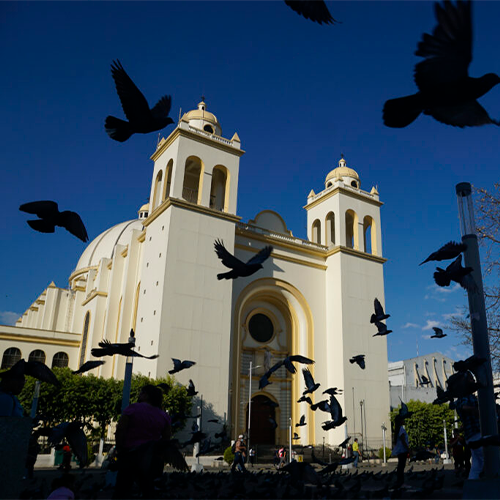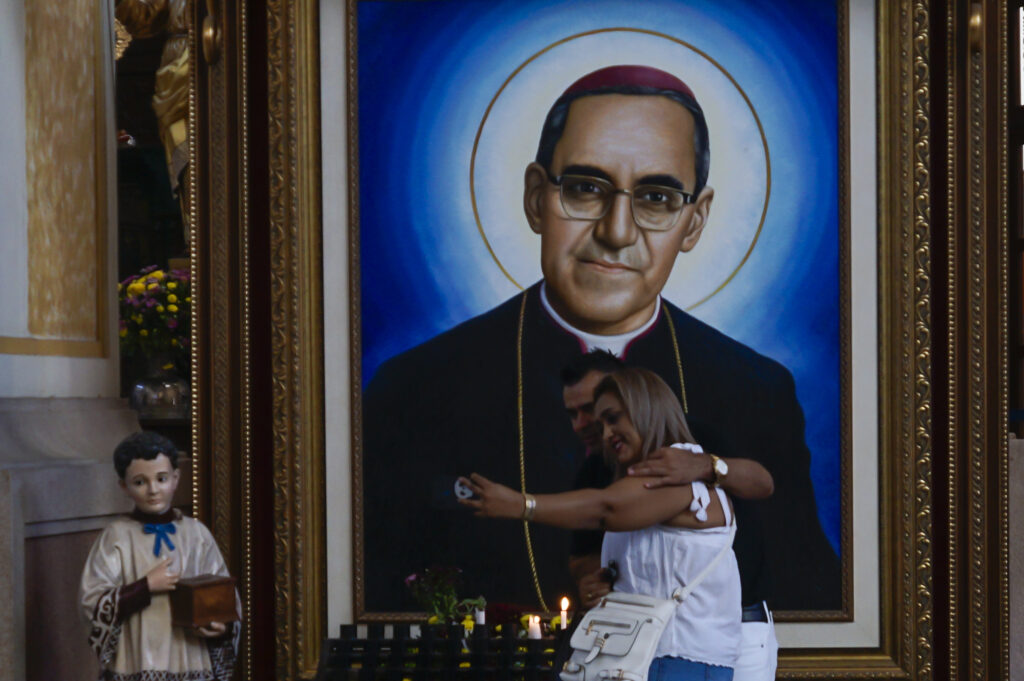
San Romero Reflection by Santana Alvarado
My stomach was in knots, thumping to the hasty rhythm of my heart, as I made my way to Dulles International Airport. As a new board member I was eager to travel to El Salvador for the first time. I was beginning a pilgrimage that would mark the birth of my hands-on commitment to Cristosal’s mission of defending human rights in the region. I was a ball of nerves until I landed, when I was warmly welcomed by the rising sun and a curious motmot, the national bird, who seemed to understand how important this trip was for me.
As sure as you are to encounter the face of San Salvador’s volcano, you will stumble upon the gentle, inquisitive, brown eyes of Saint Óscar Romero. In shops, schools, parks, and churches, the portrait of El Salvador’s first saint greets you.
On this, the 43rd anniversary of his assassination, I invite you to suspend belief in what you see around you, and instead imagine the world Archbishop Romero knew was possible, the one he preached about from the pulpit on Sunday mornings. I offer you a brief interview between San Romero and I, creatively inspired by direct quotes from and interpretations of his homilies.
What inspired you to speak out against state violence and in defense of the poor? I’m sure you didn’t know you would become a beacon of human rights liberation at the time.
It was the death of Father Rutilio Grande, whom I consider a brother. The liberation that Father Grande preached is inspired by faith and I believe it is liberation which culminates in happiness with God. This is the liberation that Father Rutilio Grande preached and it is maintained by Paul VI’s message to, ‘lament the anguish of those who remain on the margin of life, suffering from famine, chronic disease, illiteracy, and poverty.’ I was pushed to ask myself – what does the church contribute to this universal struggle for liberation?
With everything going on in El Salvador in your time and now in 2023, how can human rights defenders, including those who aren’t religious, hold fast to hope? What can you say to them?
As human rights defenders, we understand anguish. We continue to console, continue to bring comfort to painful situations. Hope is not alienation. It is hope that makes it worthwhile to engage in struggle, to be honorable.2 I ask all of you to view these things that are happening in our historical moment with a spirit of hope, generosity, and sacrifice. And let us do what we can.
There is a story about a caravan traveling through the desert with a Bedouin as guide. The travelers were desperate and thirsty, searching for water in the mirages of the desert, but their Bedouin guide kept saying, ‘Not that way, but this way.’ He had spoken these words so many times that a member of the caravan became frustrated, took out a gun and shot the guide. As the guide was dying, he extended his hand and said one last time, ‘Not that way, but this way.’ He died pointing the way to a well. We live with a hope and we die convinced of this hope. It is an ideal that never dies; it is a hand extended like that of the Bedouin in the desert who kept saying, ‘Not that way, but this way.’
You were assassinated on Sunday morning delivering a homily about a topic that is now associated with you around the world and especially in the heart of every Salvadoran: the true liberation of our people. Your life means so much to us freedom fighters. Still, do you have any regrets?
Many people don’t understand the message. They think that Christianity should not get involved in these things, but quite the opposite is true. We must not love our lives so much that we avoid taking the risks in life that history calls for. I am worried about the danger of insensitivity. We can become accustomed to seeing things and hearing news of this sort to the point where the killings no longer seem shocking for many people.
We have seen this insensitivity in many places, but we expect everyone to show their solidarity, just as a family expects it when one of them is suffering. Let us not give weapons to our enemies by our attitude of complicit insensitivity. I believe we can have a world without injustices, a world with respect for rights, a world with generous participation by all, a world without repression, a world without torture (1977). A world where there are no longer social classes, no more racial discrimination. There is no longer superior and inferior. This is a liberation that places hope in people’s hearts.


Deja una respuesta